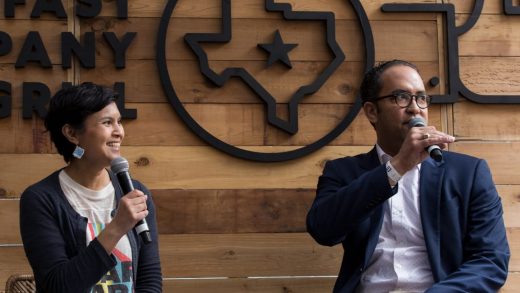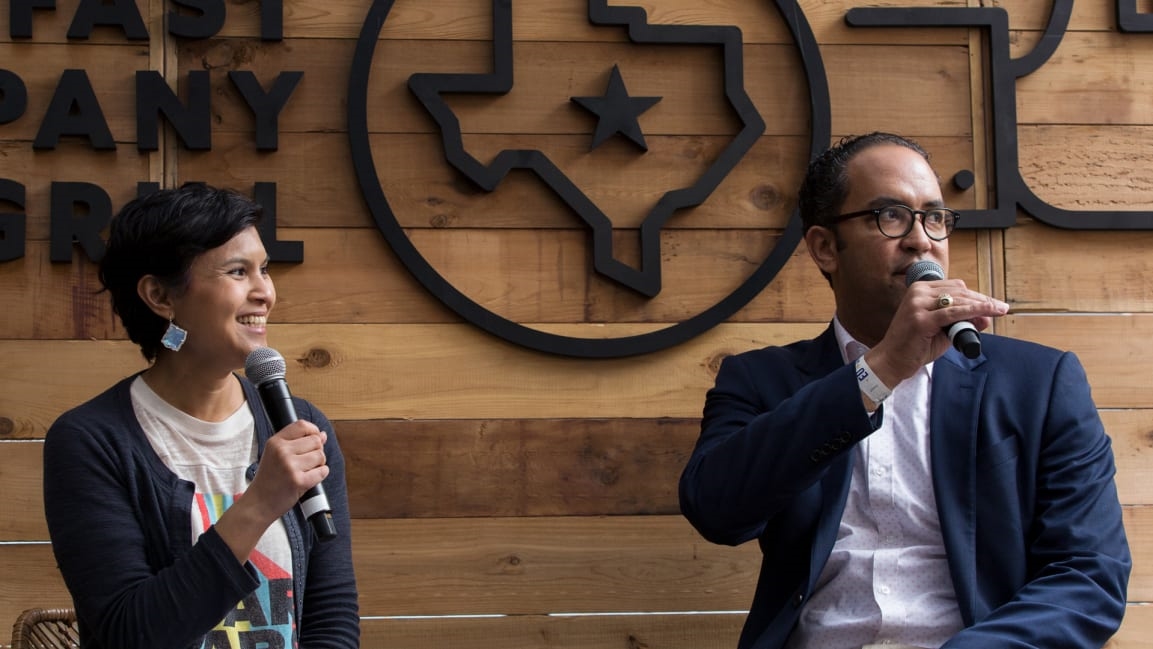Will Hurd will be heard on China’s threat to U.S. dominance
“We’re going to see two internets—one controlled by China and one controlled by everyone else.”
China vs. the U.S. (and the world) was the takeaway from Will Hurd’s talk at the Fast Company Grill at SXSW in Austin, Texas today. Though the Texas Congressman touched on education, immigration, data privacy, AI, the border wall, 5G, and myriad other topics during his interview with Fast Company editor-in-chief Stephanie Mehta, the theme throughout was that China is poised to dominate the global economy unless the U.S. and its allies in the West get their act together—and fast.
“We are in a race with China, period, end of story, he said. “They want to be the leader in 10 technologies that are going to be the leaders of the fourth industrial revolution by 2043,” noting the symbolism of that year as the centenary of Mao Zedong’s ascendance to head the Chinese Communist party.
“The largest venture capital deal ever done was a Chinese company on artificial intelligence and facial recognition,” he said, referring to a $14 billion investment in Ant Financial, formerly Alipay, last year. The financial services company is developing the technologies, “not to buy cookies in the store, but in order to track and continue to abuse human rights,” said Hurd.
Hurd also worried about which companies, and which countries, will dominate emerging 5G wireless technology, noting U.S. dominance of the 4G era came from “super companies” like Google, Amazon, Apple, and Facebook, who all thrived by optimizing their services for the communications standard.
Education and immigration both came back to China too, with Hurd noting that American students are falling behind their overseas competition.
“How are we preparing our kids for jobs that don’t exist today?” asked Hurd, noting that 79% of students in computer science advanced degree programs at U.S. institutions are not U.S. citizens.
“Should we have a path for citizenship? If you’re coming here and getting an advanced degree, I don’t want you going to back to China, I don’t want you going to Canada, I want you staying here,” proposing that academic visas automatically convert to H1-B skilled worker visas for such students.
In another part of the conversation, Hurd touched on the importance of keeping skilled workers in the U.S. in philosophical terms, explaining that when it comes to sensitive technologies like AI and facial recognition, “we have to make sure it’s being designed by the U.S. and our allies—so our principles and our ideals are developed.”
Even that might not be enough, as Hurd expressed concern about Chinese cultural values when it comes to intellectual property, noting his audience’s tech-heavy, startup-focused demographic. “There is no question that China has stolen our intellectual property. If you’re doing something interesting, the Chinese already know.” The former CIA operative has previously said that he believes the U.S. was in a “hot war” with China in the realm of cybersecurity.
“The future of cyberwarfare is going to be good AI vs. bad AI. We’re going to have to deal with a speed that is impossible to comprehend,” he told Mehta and the crowd, “so we are going to have to get it right.”
The same goes for data privacy, a matter on which Hurd has been working on crafting bipartisan legislation modeled on the European Union’s. “Did the world come to an end after GDPR? I don’t think so. I just learned a lot of websites have cookies on them. This is a conversation we should be having.”
Hurd also repeated his stance on the DACA debate, having previously said he favors a “permanent, legislative” solution for the 1.2 million undocumented young adults brought to the U.S. as children and “already contributing to our economy and our society.”
With 820 miles of U.S.-Mexico border in his sprawling district, Hurd noted he favors a “smart wall” approach that combines technology like radar, lidar, and night-vision cameras with physical barriers in denser population areas.
No matter the topic, protecting America’s economic dominance—and its future—was at the forefront of Hurd’s talk.
“This is a race. We are in a competition. I’m not being disparaging here. I don’t want to be the U.K. I don’t want to be Holland. I want to make sure the U.S. economy stays the strongest economy in the world.”
(11)



